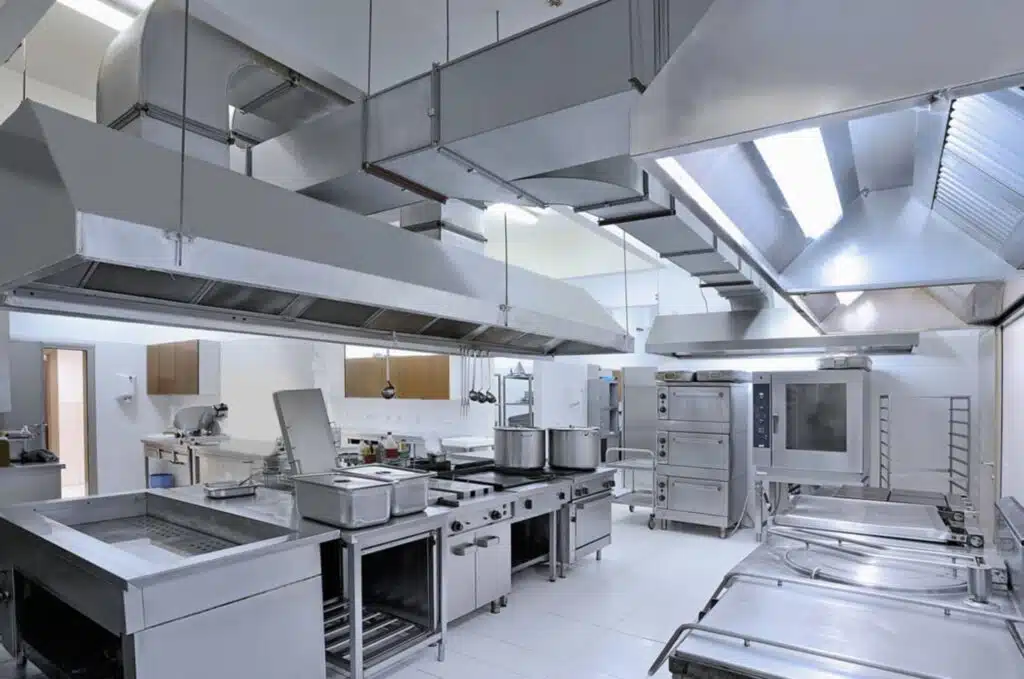18 Sep Why Skipping Regular Kitchen Extraction Cleaning Will Damage Your Business
Commercial kitchens operate under intense pressure every day, and between managing staff and maintaining quality service, it’s tempting to postpone what seems like routine maintenance. But when regular kitchen extraction cleaning is delayed or skipped entirely, you expose your entire operation to risks that can shut you down.
From fires and invalidated insurance to staff illness and costly downtime, you’re gambling with your business’s future. Neglecting extraction system cleaning isn’t a shortcut; it’s a liability.

Why Regular Kitchen Extraction Cleaning Isn’t Optional
A commercial kitchen ventilation system captures and removes contaminated air through a network of canopies, ductwork, fans, and filters. This helps to maintain airflow and protects your building from the build-up of highly flammable residues.
Over time, though, even the best-designed systems accumulate grease. Every cooking process releases airborne particles that gradually coat the internal surfaces of your extraction system. If not cleaned to TR19 standards, this buildup increases the risk of fire and compromises air quality.
Fire risks and insurance
Grease build-up in your kitchen extraction system is a fuel source just waiting for a spark. Once ignited, these fires spread fast – often beyond the kitchen to other parts of the building, causing extensive structural damage.
Regular kitchen extraction cleaning removes grease buildup before it creates operational and safety risks. Most commercial insurance policies clearly state that fire cover is only valid if extraction systems are professionally cleaned at appropriate intervals. Without proof of TR19-compliance, your insurer can – and likely will – refuse to pay out. That means the cost of fire damage, business interruption losses, and legal claims would sit squarely with you.
Equipment wear and tear
Grease build-up also impacts the service life of your extraction system. When airflow is restricted, fans are forced to work harder (increasing energy consumption) and motors overheat, leading to accelerated component wear. Over time, this means more frequent repairs, expensive replacements, and unplanned downtime. On the other hand, regular extraction system cleaning maintains optimal airflow, reducing the stress on your system so it operates more efficiently and consumes less energy.
TR19 Compliance, Fines, and Legal Fallout
According to the Health & Safety Executive (HSE) and fire safety legislation, extraction systems must be regularly cleaned (and documented). TR19 guidance, issued by BESA, is the industry-recognised benchmark that inspectors use to assess compliance. Failing to meet these standards can result in enforcement action, heavy fines, or even closure notices.
Employers are also required to provide safe working conditions under the Health and Safety at Work Act. A ventilation system that hasn’t been maintained exposes staff to fire risks, creating potential liability for workplace accidents.
Loss of food hygiene ratings and revenue
Poorly maintained ventilation systems can also harm your hygiene assessments. Grease-contaminated environments tend to harbour bacteria, creating unpleasant odours. If smells of stale grease or smoke seep into dining areas or shared spaces, it quickly erodes confidence in the cleanliness of your operation.
A downgraded food hygiene rating can put customers off and impact your bottom line. For catering contracts, especially in schools, care homes, and hospitals, a bad rating may even cost you the work. If that happens, you’ll be faced with the challenge of rebuilding your reputation and winning back customer trust. Regular kitchen extraction cleaning eliminates odour sources, maintaining the pleasant atmosphere your customers expect.
Employee health issues
Staff working in kitchens with ventilation systems that haven’t been cleaned in a long time are exposed to poor air quality with higher levels of smoke, carbon dioxide, and grease particles. This can lead to headaches, fatigue, respiratory issues, increased absence rates, and lower productivity. Professional extraction system cleaning helps maintain air quality standards that protect your employees’ health and reduce health-related absences.
Schedule Regular Kitchen Extraction Cleaning
The cost of a single fire, a failed hygiene inspection, a regulatory fine, or a major equipment breakdown dwarfs the cost of planned maintenance. Deduct Ltd specialises in TR19-compliant extraction system cleaning.
Our team works around your service times to minimise disruption, and every clean comes with a full post-clean report, providing evidence of compliance for inspections. Skipping regular kitchen extraction cleaning is not worth the risks to your staff, customers, and bottom line. Contact Deduct Ltd today.

